In Praise of Love (Jean-Luc Godard) 2001
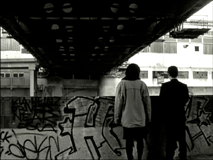 Jean-Luc Godard's latest film, In Praise of Love, is absolutely
heartbreaking. It's also quite difficult. I imagine most of its audience will
reject it without ever understanding it. The film really will only work for you
if you understand that for Godard, cinema is all-encompassing. The
"Love" in the title is Godard's love for cinema. His work transcends
any boy-meets-girl posturing of typical love stories. The conflict arises from
the disconnect between the admiration that Godard felt for Hollywood's films and
the guilt that he feels for enjoying those inherently Capitalist images. The film opens with Edgar,
a Parisian director that is working on a vague, ambitious project about the
stages of love. He wants to show the four stages of love (meeting, passion,
separation, and reconciliation) across the three ages people go through (young
adult, adult, old). Edgar lives alone, and seems to live only for his work. This
is Godard's first film shot in Paris in over twenty years, and he shows a city
that seems to be overrun with industry. The skylines are abuzz with the neon
lights of flashing billboards. There are plenty of scenes of Edgar reading or
speaking against a backdrop of noise. That noise seems equally likely to come
from passing trains, the blare of an action film shootout, or as it does in one
scene, American Beauty).
Jean-Luc Godard's latest film, In Praise of Love, is absolutely
heartbreaking. It's also quite difficult. I imagine most of its audience will
reject it without ever understanding it. The film really will only work for you
if you understand that for Godard, cinema is all-encompassing. The
"Love" in the title is Godard's love for cinema. His work transcends
any boy-meets-girl posturing of typical love stories. The conflict arises from
the disconnect between the admiration that Godard felt for Hollywood's films and
the guilt that he feels for enjoying those inherently Capitalist images. The film opens with Edgar,
a Parisian director that is working on a vague, ambitious project about the
stages of love. He wants to show the four stages of love (meeting, passion,
separation, and reconciliation) across the three ages people go through (young
adult, adult, old). Edgar lives alone, and seems to live only for his work. This
is Godard's first film shot in Paris in over twenty years, and he shows a city
that seems to be overrun with industry. The skylines are abuzz with the neon
lights of flashing billboards. There are plenty of scenes of Edgar reading or
speaking against a backdrop of noise. That noise seems equally likely to come
from passing trains, the blare of an action film shootout, or as it does in one
scene, American Beauty).
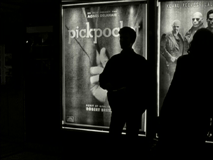 The fear of the Hollywood film is omnipresent here. Edgar is having
difficulty casting his adult actors, and when one of his producers suggests he
simply drop that segment, he admonishes them, saying he might as well cast Julia
Roberts. Edgar is striving for integrity in a world that doesn't seem
particularly interested in creating works with it. Even Paris in this film seems
to have been swamped with an American mentality. Godard argues American culture
is like a sponge that absorbs the cultures of other countries, but leaves a
sticky residue of history behind that makes the absorbed culture meaningless. In
Godard's view, American culture has no room for historical accuracy. The film
most obviously illustrates this moment when the director stands before posters
for Bresson's Pickpocket and The Matrix. He places himself in
front of the one for the Bresson film. As Edgar searches for his
"adults" for his film, he is told to meet with Elle, a working class
girl that he finds he knew from a few years earlier. She's not quite right for
the part, and they drift away as the project falls apart. The thing seems to be
that no one is quite right for the part. Edgar is seen getting on a monorail
marked "Dranoy Future", but is seem immediately getting off. There is
no compromise possible here, and Edgar cannot progress. He comes to say that
there is no such thing as an adult as he realizes his own creative impotence.
The fear of the Hollywood film is omnipresent here. Edgar is having
difficulty casting his adult actors, and when one of his producers suggests he
simply drop that segment, he admonishes them, saying he might as well cast Julia
Roberts. Edgar is striving for integrity in a world that doesn't seem
particularly interested in creating works with it. Even Paris in this film seems
to have been swamped with an American mentality. Godard argues American culture
is like a sponge that absorbs the cultures of other countries, but leaves a
sticky residue of history behind that makes the absorbed culture meaningless. In
Godard's view, American culture has no room for historical accuracy. The film
most obviously illustrates this moment when the director stands before posters
for Bresson's Pickpocket and The Matrix. He places himself in
front of the one for the Bresson film. As Edgar searches for his
"adults" for his film, he is told to meet with Elle, a working class
girl that he finds he knew from a few years earlier. She's not quite right for
the part, and they drift away as the project falls apart. The thing seems to be
that no one is quite right for the part. Edgar is seen getting on a monorail
marked "Dranoy Future", but is seem immediately getting off. There is
no compromise possible here, and Edgar cannot progress. He comes to say that
there is no such thing as an adult as he realizes his own creative impotence.
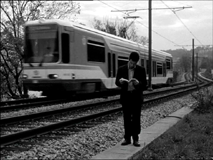 Edgar, like Godard, views cinema as a beautiful, universal language. One
character remarks "(political) state is the opposite of love
(cinema)". To Godard, expression should not be something that can be deemed
of a certain nationality. He rallies against commercial culture whether it's in
America, France, or Kosovo. The first half of the film dabbles in the idea of
this universal language by showing the film's producer's hotel (Hotel
Intercontinental), by expressing admiration for those who have left their home
countries, and by having a character remark that a soldier's country of origin
should be stricken from his eulogy, but it's the film's second half that tackles
the issue head on.
Edgar, like Godard, views cinema as a beautiful, universal language. One
character remarks "(political) state is the opposite of love
(cinema)". To Godard, expression should not be something that can be deemed
of a certain nationality. He rallies against commercial culture whether it's in
America, France, or Kosovo. The first half of the film dabbles in the idea of
this universal language by showing the film's producer's hotel (Hotel
Intercontinental), by expressing admiration for those who have left their home
countries, and by having a character remark that a soldier's country of origin
should be stricken from his eulogy, but it's the film's second half that tackles
the issue head on.
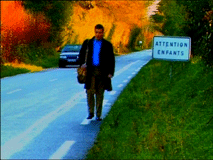 In this half, which takes place two years earlier, Edgar meets Elle at a farm
that is home to her grandparents. They are in dire financial straits, and have
been contacted by Hollywood representatives (from "Steven Spielberg and
Associates, Incorporated") who want to purchase their life story's rights,
since the couple led a Christian resistance during the Holocaust. The Hollywood
executives swoop in by helicopter and sports car to tell the old couple that the
film is to star (Oscar-winner) Juliette Binoche, and is to be written by an
American, as if that will comfort the old couple, that seems barely aware motion
pictures exist at all. The couple, of course, is never explicitly told that the
film is to include nude scenes, a notation buried deep within the thick
contract, until Elle points it out. Elle, like Edgar, resents the executives and
what they represent. She makes their time difficult, as she demands a more
specific definition of America. The executives are flummoxed by this, and her
knowledge only underlines Godard's point that America is a land that has no real
culture of its own, but, rather, must appropriate it from elsewhere.
In this half, which takes place two years earlier, Edgar meets Elle at a farm
that is home to her grandparents. They are in dire financial straits, and have
been contacted by Hollywood representatives (from "Steven Spielberg and
Associates, Incorporated") who want to purchase their life story's rights,
since the couple led a Christian resistance during the Holocaust. The Hollywood
executives swoop in by helicopter and sports car to tell the old couple that the
film is to star (Oscar-winner) Juliette Binoche, and is to be written by an
American, as if that will comfort the old couple, that seems barely aware motion
pictures exist at all. The couple, of course, is never explicitly told that the
film is to include nude scenes, a notation buried deep within the thick
contract, until Elle points it out. Elle, like Edgar, resents the executives and
what they represent. She makes their time difficult, as she demands a more
specific definition of America. The executives are flummoxed by this, and her
knowledge only underlines Godard's point that America is a land that has no real
culture of its own, but, rather, must appropriate it from elsewhere.
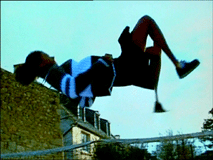 This sequence, effective as it is in skewering American sensibilities,
doesn't let the others off the hook. Edgar criticizes the media for focusing on
how large a success the film Titanic was, suggesting they actually write
about the content of the film instead, but then admits that he has never
actually seen the film. The grandparents still use their code name from the war
over fifty years later, suggesting they never wanted to lose the fame that they
attained for their (noble) deeds. The grandfather tapes a television show
entitled "The Secret War", suggesting he has supplanted his memories
of the war with those fabricated by the media. Certainly, this makes me recall
the WWII veterans that assured us young folks that the way Spielberg showed WWII
in Saving Private Ryan was "real", despite the fact that I could quote
a dozen or so films that Spielberg's movie lifted scenes from almost directly.
When Godard waxes about the power of cinema to create reality, it's episodes
like this one that make me think he is right.
This sequence, effective as it is in skewering American sensibilities,
doesn't let the others off the hook. Edgar criticizes the media for focusing on
how large a success the film Titanic was, suggesting they actually write
about the content of the film instead, but then admits that he has never
actually seen the film. The grandparents still use their code name from the war
over fifty years later, suggesting they never wanted to lose the fame that they
attained for their (noble) deeds. The grandfather tapes a television show
entitled "The Secret War", suggesting he has supplanted his memories
of the war with those fabricated by the media. Certainly, this makes me recall
the WWII veterans that assured us young folks that the way Spielberg showed WWII
in Saving Private Ryan was "real", despite the fact that I could quote
a dozen or so films that Spielberg's movie lifted scenes from almost directly.
When Godard waxes about the power of cinema to create reality, it's episodes
like this one that make me think he is right.
 The film essentially acts as Godard's personal reconciliation of his love
with cinema. He seems to realize that he is now old. Edgar's realization that
there is no such thing as an adult seems to be Godard's admission that he never
quite managed to do what he wanted with cinema when he was at his creative peak.
His creative impotency is now smacking him in the face since he realizes he is
old. Near the film's end, he has Elle read from a Bresson-penned book about the
function of the director. When she reads "the challenge of the director is
not to direct others. Rather it is to direct himself," Godard seems to be
laying the gauntlet down for future generations (though, since the only children
in the film are petitioning for a translation of The Matrix, he doesn't
seem particularly hopeful). He absolutely loves the art form, but seems to have
realized he has not entirely lived up to it. Although my trepidations in
agreeing with Godard wholeheartedly are the reason that I won't call this film a
masterpiece, I believe he quite eloquently has made his case here by creating a
romance in which the girl dies. It is astonishing and sad if Godard considers
himself a failure. Perhaps, because of the sadness in his realization of his
failure to live up to the potential of his love, when he closes the film with
the repeated intoning of "maybe nothing was said..." I shed a tear.
The film essentially acts as Godard's personal reconciliation of his love
with cinema. He seems to realize that he is now old. Edgar's realization that
there is no such thing as an adult seems to be Godard's admission that he never
quite managed to do what he wanted with cinema when he was at his creative peak.
His creative impotency is now smacking him in the face since he realizes he is
old. Near the film's end, he has Elle read from a Bresson-penned book about the
function of the director. When she reads "the challenge of the director is
not to direct others. Rather it is to direct himself," Godard seems to be
laying the gauntlet down for future generations (though, since the only children
in the film are petitioning for a translation of The Matrix, he doesn't
seem particularly hopeful). He absolutely loves the art form, but seems to have
realized he has not entirely lived up to it. Although my trepidations in
agreeing with Godard wholeheartedly are the reason that I won't call this film a
masterpiece, I believe he quite eloquently has made his case here by creating a
romance in which the girl dies. It is astonishing and sad if Godard considers
himself a failure. Perhaps, because of the sadness in his realization of his
failure to live up to the potential of his love, when he closes the film with
the repeated intoning of "maybe nothing was said..." I shed a tear.
* * * *
October, 2001
06-23-02 - After finally seeing this film a second time, I have pretty much
the same impression of it, but I got a bit more out of a few more images, since
I knew what the movie was working toward. The image of the suitcase at the end
of the first half of the movie recalls the Holocaust in a way that I wasn't able
to note the first time through, and basically Godard appears to be equating the
actions of the Nazis with the actions of the dumbed down media, which is nothing
if not an extreme stance (and really not one that I could agree with). Still, a
second viewing did more to improve than hurt my view of the movie, since I came
away with more insight into the movie's central theme, which basically argues
that all of historical experience can be distilled down to personal experience
and vice versa. To not acknowledge history when telling a personal story, as
Godard accuses the Americans of doing, is to not have insight into that personal
story. To look at history without attempting to understand the personal side of
it is to invite a misunderstanding that will cause tragedies to repeat
themselves (as they do here).
Jeremy Heilman